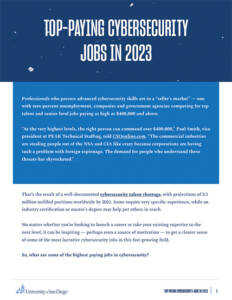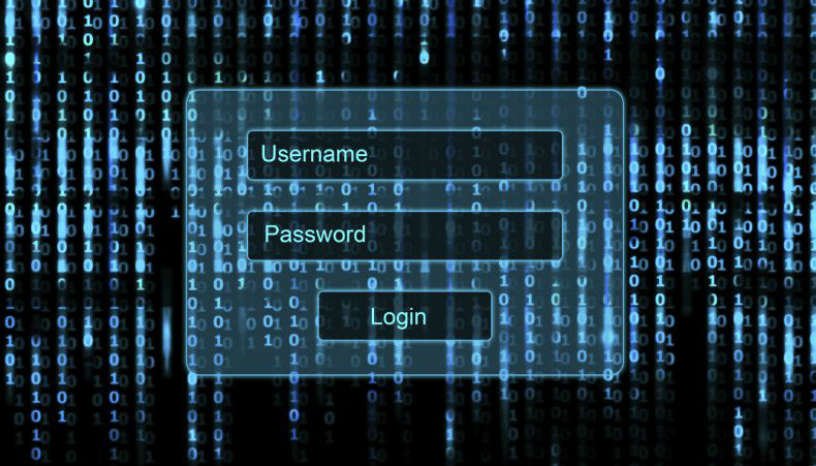Are you intrigued by the inner workings of adware, bots, ransomware, Trojan horses, viruses and worms? Do you want to be on the front lines of cybersecurity? Do you enjoy analytics and dissecting problems? If you’ve answered yes to any of these questions, the position of malware analyst might be a good fit.
Whether you’re considering a career in cybersecurity or you’d like to take on a different role within this ever-growing field, we encourage you to explore this malware analyst career guide for everything you need to know about this vitally important position.
What is a Malware Analyst?
What Does a Malware Analyst Do?
Malware Analyst Job Description
Malware Analyst Job Requirements
Career Outlook for Malware Analysts
How Much Do Malware Analysts Make?
Education Requirements?
Continued Learning for Malware Analysts?
Work Experience
Hard Skills Needed — Plus Tools You Need to Know
Soft Skills Needed
Certifications for Malware Analysts
Companies Hiring Malware Analysts
Related Careers
What is a Malware Analyst?
As McAfee explains, “malware is a catch-all term for any type of malicious software designed to harm or exploit any programmable device, service or network. Cybercriminals typically use it to extract data that they can leverage over victims for financial gain.” A malware analyst is a specialized cybersecurity position that focuses on combating common cyber threats and tactics. As the name implies, a person in this position analyzes and examines malware from all angles.
What Does a Malware Analyst Do?
A malware analyst works in computer and network security “to examine, identify, and understand the nature of cyber-threats such as viruses, worms, bots, rootkits, and Trojan horses,” explains the Infosec Institute.
Here’s another description, courtesy of Cybersecurity Guide: “The primary function of a malware analyst is to identify, examine, and understand various forms of malware and their delivery methods. This malicious software includes all the diverse forms of adware, bots, bugs, rootkits, spyware, ransomware, Trojan horses, viruses, and worms.”
A malware analyst must work closely with classifications of malicious software, some of which we’ve defined below:
- Virus – A type of malware that grows by copying itself and becoming part of a program, spreading from one computer to another.
- Worms – This is similar to a virus but doesn’t require a host program or human to grow.
- Trojans – A “Trojan horse” is software that looks legitimate — but isn’t. Users believe they are downloading something genuine, but once the software is downloaded, it infiltrates the system. This type of malware only spreads through human interaction, such as opening an email attachment or downloading a file.
Other types of malware include keyloggers, ransomware, logic bombs, bots, adware, spyware and rootkits.
Malware Analyst Job Description
Here are some typical responsibilities, courtesy of the Infosec Institute and Cybersecurity Guide:
- Responds to incident reports
- Recommends and carries out procedures designed to help systems recover from inflicted damage
- Responsible for preventing the spread of malware
- Classifies malware based on threats and characteristics
- Stays up to date on the latest malware and updates software
- Writes alerts to keep security team informed
- Creates documentation for security policies
You can also browse job postings to see what specific companies are looking for.
Malware Analyst Job Requirements
The requirements of any job will depend on the position, especially whether it’s more entry- or senior-level, but the following requirements are typical for all types of malware analyst positions:
- Bachelor’s degree in a relevant field (cybersecurity or computer science)
- Experience in information security and/or programming
- Certifications are typically not required but could help applicants stand out
An advanced degree and/or a security clearance may be required, depending on the position.
Career Outlook for Malware Analysts
In general, the career outlook for all types of cybersecurity jobs — malware analysts included — is quite positive. As popular job site Monster explains: “Cybersecurity jobs are in high demand and it doesn’t seem like the need for more security professionals is going anywhere in the foreseeable future. Cyber attacks are only becoming more common and more harmful, and even though we tend to only hear about the attacks of high-profile entities, no company — or individual for that matter — with an online presence is immune to attacks.”
Employment of information security analysts, which includes positions like malware analyst, is projected to grow 33% from 2020 to 2030 (much faster than the national average of 8%), according to the U.S. Bureau of Labor Statistics.
How Much Do Malware Analysts Make?
The exact salary will depend on the position, how much experience is needed, the location of the job and other factors. We’ve included a list below of average salaries, which do include a large range. Remember — salaries are often a large range, and these numbers below are also dynamic and subject to change in real time.
- The 2020 median pay for information security analysts was $103,590 (U.S. Bureau of Labor Statistics)
- Median malware analyst salary in the United States is $91,886 (Salary.com)
- National average salary is $90,383 (ZipRecruiter)
- Average annual salary of $114,000 with top-level positions around $190,000 (Talent.com)
- Average salary in the U.S. is $165,000 (Cybersecurity Guide)
Education Requirements
A bachelor’s degree in a related field, such as computer engineering or computer science, is usually needed for a malware analyst position. An advanced degree is typically not required, but can give you an edge over other job applicants and provide additional training and industry knowledge. Consider a master’s degree in cybersecurity, computer science or computer engineering.
Continued Learning for Malware Analysts
It’s important for malware analysts to stay up to date on the latest malware techniques and methods and general security knowledge. Since the cybersecurity world is constantly evolving, this will help analysts predict and stay ahead of potential threats and attacks. Continued learning includes certificates, advanced degrees, attending conferences and networking with industry leaders.
Work Experience
If you’re interested in a career as a malware analyst, consider a job in a related technology field that involves coding and developing. Experience with computer programming and software programming can also help, according to The Hacker News.
Hard Skills Needed — Plus Tools You Need to Know
Hard skills are crucial in the field of cybersecurity. As outlined by Cybersecurity Education Guides, some of the most sought-after ones for malware analysts include:
- Knowledge of operating systems and networking
- Programming skills
- Understanding of security principles
- Ability to identify, contain, disassemble, and mitigate zero-day malware
- Ability to reverse engineer code
- Ability to work with high-level programming language
Soft Skills Needed
You also need a fair share of soft skills to succeed as a malware analyst, including:
- Being resourceful
- Thinking outside the box
- Good communication skills
- Curious and determined
Other top soft skills that employers value include critical thinking, leadership, a positive attitude, teamwork and a strong work ethic.
Certifications for Malware Analysts
If you already work in the cybersecurity field, you understand the significance of cybersecurity certifications. While they may not be required for a malware analyst position, they are incredibly important. Here are some common ones that are beneficial for this position:
- Certified Information Systems Security Professional
- Certified Ethical Hacker
- Certified Penetration Tester
- Certified Forensic Computer Examiner (CFCE)
- Certified Reverse Engineering Analyst
- GIAC Reverse Engineering Malware (GREM)
- TS/SCI clearance (depending on the position, this may be required)
[RELATED]: Top Cybersecurity Certifications: Which Ones Are Right for You? >>
Companies Hiring Malware Analysts
Malware analyst positions are available in a variety of industries. Here is a sample from LinkedIn and Indeed of top companies that are hiring for this type of position:
- Northrop Grumman
- Oracle
- Microsoft
- Apple
- Zoom
- Dell Technologies
- National Security Agency
- Colgate-Palmolive
- Visa
- Deloitte
- FanDuel
Related Careers
Cybersecurity Analyst
As a cybersecurity (or security) analyst, you will plan and implement security measures to protect the computer networks and systems of a company or organization. Other possible responsibilities include creating a disaster recovery plan and keeping up to date on IT security and the latest cyber attack methods.
Cybersecurity Specialist
These positions, often called information (IT) security specialists or network security specialists among other related job titles, play a central role in securing the information systems of businesses and other organizations. Cybersecurity specialists work on the front lines — and behind the scenes — to protect digital systems and assets from hackers, threats and vulnerabilities.
Computer Crime Investigator
Common job duties for this position include finding and navigating the “dark web,” processing digital crime scenes, interviewing victims/witnesses, looking for and examining recovered data and determining whether a crime has been committed.
Incident Responder
A person in this position will investigate and respond to cyber-related incidents. Responsibilities typically include coordinating incident response, performing cyber defense trend analysis and reporting, monitoring external data sources and more. This role may also be referred to as:
- Incident Handler
- Incident Responder
- Incident Response Analyst
- Incident Response Engineer
- Incident Response Coordinator
- Intrusion Analyst
- Computer Network Defense Incident Responder
- Computer Security Incident Response Team Engineer
Vulnerability Researcher
As the name implies, a vulnerability researcher investigates a company or organization’s digital susceptibilities. They often review and analyze programs for potential vulnerabilities and document specific attacks should they occur.
Computer Forensics Analyst
A computer forensics analyst reviews and investigates security incidents. This typically includes analyzing files, evidence and other information; summarizing technical findings; examining recovered data and more. This role may also be referred to as:
- Computer Network Defense Forensic Analyst
- Digital Forensic Examiner
- Cyber Forensic Analyst
- Forensic Technician
Chief Information Security Officer (CISO)/Chief Security Officer
This is the executive chiefly responsible for an organization’s information and data security. Also sometimes known as Director of Security, this is typically a high-paying position with salaries ranging from $140,000 to $240,000.
Other job titles related to malware analyst include:
- Malware Forensic Analyst
- Anti-Malware Analyst
- Detection and Threat Analyst
- Insider Threat Analyst
- Cyber Threat Engineer
- Cyber Incident Response Analyst
- Cyber Defense Incident Responder
- Threat Detection Analyst
Helpful Links and Resources
For more information, check out these additional tools:
- Cybersecurity Resources – National Initiative for Cybersecurity Careers and Studies (NICCS)
This list of resources and links is provided by NICSS, the premier online resource for cybersecurity training. - Cybersecurity Resources – U.S. Department of Homeland Security (DHS)
This list includes published documents and other references and links from the DHS Science and Technology Directorate. - The Cyber 100: Cybersecurity Companies You Should Know
Meet 100 of the most influential players in cybersecurity. - How Can I Get an Entry-Level Cybersecurity Job? [Career Guide]
If you want to get started in the cybersecurity world, this is a good place to start. - Top Paying Cybersecurity Jobs
Whether you’re looking to launch a career or take your existing expertise to the next level, check out the most lucrative cybersecurity jobs in this fast-growing field. - Cybersecurity Employment Growth Report
This special report offers a comprehensive review of the current state of the cybersecurity jobs market, as well as an eye-opening look at the overall industry landscape.
FAQs
Q: How is a malware analyst different from a security analyst?
A: The positions are similar and in some cases may overlap. A malware analyst is a more specialized position that focuses solely on malware (worms, Trojan horses, viruses, etc.) A security (or cybersecurity) analyst will plan and implement security measures to protect the computer networks and systems of a company or organization. Other possible responsibilities include creating a disaster recovery plan and keeping up to date on IT security and the latest cyber attack methods, which includes all types of malware.
Q: What is the average salary for a malware analyst?
A: The exact salary will depend on the position, how much experience is needed, the location of the job and other factors. Salaries range from $90,000 to $150,000 with top-level positions close to $200,000 — or more.
Q: Is a master’s degree required to become a malware analyst?
A: An advanced degree is typically not required, but there are many benefits in obtaining one. Not only will a degree set you apart from other job applicants, but it illustrates your drive and dedication to furthering your cybersecurity career. You will meet other like-minded cybersecurity professionals and learn about the latest trends and techniques in the field from industry leaders. Plus, you’ll achieve a deeper understanding of cybersecurity concepts, topics and theories.
Educational Preparation for Malware Analyst
This malware analyst career guide was brought to you by The University of San Diego — a highly regarded industry thought leader and education provider that offers the 100% online Master of Science in Cyber Security Operations and Leadership degree. The program features a practical, cutting-edge curriculum taught by expert instructors who share insights drawn from highly relevant industry experience.





